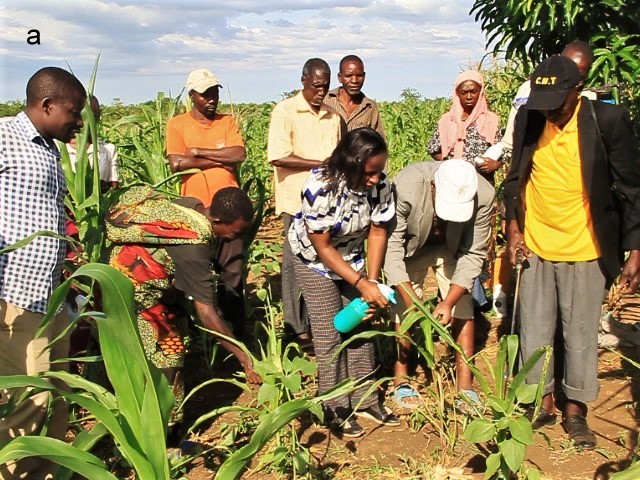Biopesticide against fall armyworm registered in the United Republic of Tanzania

A biopesticide that fights the highly destructive fall armyworm (FAW), a new pest that threatens food security and livelihoods, has been developed by researchers in the United Republic of Tanzania and registered for use there.
Research into the biopesticide has been conducted at the Nelson Mandela African Institution of Science and Technology in Arusha, led by Never Zekeya Mwambela and supported by the Food and Agriculture Organization of the United Nations (FAO). Both field and laboratory trials of the biopesticide have been conducted.
Based on the fungus Aspergillus oryzae, the biopesticide has been named “Vuruga” which means “to disrupt” in the Swahili language. Mwambela, who began working on FAW control projects over two years ago as part of her PhD research, first isolated the A. oryzae fungus, and then injected it into FAW larvae at its various stages. Once she determined the appropriate concentration for field applications, plans were made for multilocation field trials of the A. oryzae.
FAO has taken the lead in responding to FAW through its Global Action for Fall Armyworm Control. One of the Global Action’s key components is reducing crop yield losses due to FAW, which can be achieved by getting effective biopesticides to farmers. Thus, FAO’s Technical Cooperation Programme (TCP), involving the Government of the United Republic of Tanzania and the EU-funded project STOSAR, provided the means that allowed Mwambela to conduct trials in eight regions in the United Republic of Tanzania.

Figure 1. Application of the biopesticide by its creator, Never Zekeya Mwambela (holding the sprayer, center). Photo by Mushobozi Baitani, FAO
The country has a rigorous process of quality assurance for biological control products that includes the National Plant Protection Advisory Committee (NPPAC), which provides approval for product registration. But approval is only given on recommendation from its subcommittee, the Biocontrol Agents Subcommittee (BCAS). The latter is a technical body comprised of internal stakeholders from academia who understand plant protection; as well as representatives of research Institutes, pesticide regulators and environmental scientists. The National Biocontrol Centre (NBCC) evaluates biopesticide efficacy for the BCAS and all field trials must include farmer participants. Trials must be supervised by the NBCC and conducted at numerous locations representing multiple agroecological zones, with a minimum of three replications and for at least two seasons. Costs must be paid by the product registration proponent.

Figure 2. Bottles of the biopesticide. Photo taken by Zacharia Gadiye, Tanzania Ministry of Agriculture
In the case of the Vuruga biopesticide, it was first deemed effective by the NBCC and later evaluated by the plant protection and biocontrol committees. Final approval for the biopesticide registration came from the NPPAC in June 2020, clearing the way for mass production to make Vuruga available to farmers. The biopesticide is expected to be a major boost in controlling FAW, which has plagued farmers’ fields since its invasion of the United Republic of Tanzania in 2017. Vuruga also comes as the world faces the COVID-19 pandemic and the unprecedented challenge that it has created for agriculture and food systems. Losing food crops to FAW, particularly in countries already facing food security challenges, cannot be tolerated.
